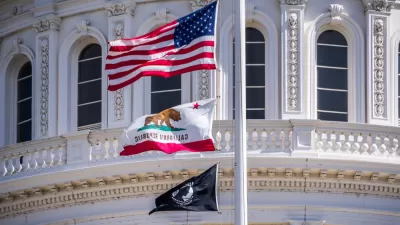There are similarities between the policy actions of former Prime Minister Stephen Harper's Conservative government and the nascent Trump Administration. The differences in approach between these two examples are also telling.

The news so far regarding to the Trump Administration's approach to environmental policy has been unsurprising, but alarming nonetheless.
In one week, news leaked of the administration's plans to freeze grants at the U.S. Environmental Protection Agency. Andrew Revkin and Jesse Eisinger reported on the freeze, as did Katie Sheppard. Brad Plumer followed with an explainer post that provides additional information about EPA grants.
The Trump Administration will include former Oklahoma Attorney General and devout climate change denier Scott Pruitt, who has been tapped to lead the EPA. Planetizen correspondent Irvin Dawid has provided continuing coverage of the implications of that choice by President Trump.
The Trump Administration has also removed all climate change information from the White House website and shut down the Twitter handle of Badlands National Park for tweeting climate change research.
For those looking for some precedent to these anti-environmentalist actions, look no farther than the U.S.'s neighbor to the north, Canada. An article by Sarah Zhang takes a look at Stephen Harper, who served as the prime minister of the Canadian government from 2006 to 2015.
According to Zhang, under Harper, "the Canadian government routinely prevented scientists from talking to the media, while downplaying the effects of climate change."
The climax in what some have called Canada’s war on science was Bill C-38, a 2012 budget bill that stealthily stripped away environmental protections and cut funding at research institutes around the country. Government scientists lost their jobs, and monitoring stations shut down.
What stemmed the tide of anti-environmentalist action in Harper's Canada? Protests, and lots of them. To get more perspective on Harper's policies, and how they might inform an understanding of the actions of the Trump Administration, Zhang speaks with Chris Turner, a Calgary-based environmental journalist and author of The War on Science: Muzzled Scientists and Wilful Blindness in Stephen Harper’s Canada.
FULL STORY: Looking Back at Canada's Political Fight Over Science

Planetizen Federal Action Tracker
A weekly monitor of how Trump’s orders and actions are impacting planners and planning in America.

Chicago’s Ghost Rails
Just beneath the surface of the modern city lie the remnants of its expansive early 20th-century streetcar system.

San Antonio and Austin are Fusing Into one Massive Megaregion
The region spanning the two central Texas cities is growing fast, posing challenges for local infrastructure and water supplies.

Since Zion's Shuttles Went Electric “The Smog is Gone”
Visitors to Zion National Park can enjoy the canyon via the nation’s first fully electric park shuttle system.

Trump Distributing DOT Safety Funds at 1/10 Rate of Biden
Funds for Safe Streets and other transportation safety and equity programs are being held up by administrative reviews and conflicts with the Trump administration’s priorities.

German Cities Subsidize Taxis for Women Amid Wave of Violence
Free or low-cost taxi rides can help women navigate cities more safely, but critics say the programs don't address the root causes of violence against women.
Urban Design for Planners 1: Software Tools
This six-course series explores essential urban design concepts using open source software and equips planners with the tools they need to participate fully in the urban design process.
Planning for Universal Design
Learn the tools for implementing Universal Design in planning regulations.
planning NEXT
Appalachian Highlands Housing Partners
Mpact (founded as Rail~Volution)
City of Camden Redevelopment Agency
City of Astoria
City of Portland
City of Laramie





























